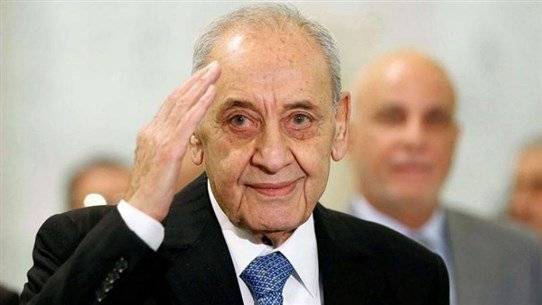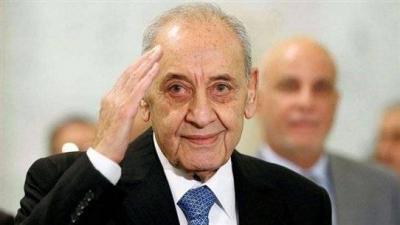A political source is concerned that Lebanon might face a political crisis with the election of the new parliament, following a worsening living crisis amid a lack of solutions to halt the ongoing collapse, leading to a loosening of security that burdens the security forces, which remain on high alert with their modest capabilities to prevent the country from descending into chaos. The concern for the security situation, the source tells "Asharq Al-Awsat," arises from the pressures faced by Lebanese citizens regarding their livelihoods, should the prospects for a breakthrough remain distant with the conclusion of the current parliament's term today, coinciding with the conversion of Prime Minister Najib Mikati's government into a caretaker government.
According to the political source, the election of the new parliament will inevitably lead to the question of whether the atmosphere is conducive to electing a vice president of the council with minimal damage that would delay parliamentary division, given the absence of a parliamentary majority that could transform into majorities in light of Secretary-General of "Hezbollah" Hassan Nasrallah's acknowledgment that the Resistance Axis, which he leads, does not have the majority that has instead gone to his opponents, without them consolidating into a united parliamentary front. The battle to restore the regularity of constitutional institutions begins with the election of a new parliament president, with expectations of renewing President Nabih Berri's term due to the belief that his election signals, as the source indicates, a reshuffling of the cards, since the division regarding his renewal will not be between a parliamentary majority and a minority based on the outcomes of the parliamentary elections that brought into parliament a political diversity represented by the seats won by reformist forces and a number of independent deputies, including those within the orbit of political Harirism.
President Berri is returning to the parliament presidency with fewer votes, unlike his election in previous rounds that recorded unprecedented numbers, which could reach around 70 deputies, should the members of the "Free Patriotic Movement" decide to support him alongside the support from the "Democratic Parliamentary Bloc," which has not hesitated to decisively choose side with its ally Berri, irrespective of the political alignments emerging from the parliamentary elections.
In this context, a parliamentary source tells "Asharq Al-Awsat" that there is no alternative to Berri’s election as parliament president because the Shiite duo is united in nominating him. Any rumors about the possibility of nominating other Shiite deputies are merely political maneuvering without any actual effect in the election session, the timing of which is determined by the eldest member, Berri himself. The parliamentary source points out that raising the stakes against Berri does not reflect reality as long as he has no competitor among Shiite deputies, affirming that representatives of reformist forces are distancing themselves from engaging in political maneuverings after it became clear that former Bar Association head Melhem Khalaf is not inclined to run for the position of vice president of the parliament.
The reformist forces, the parliamentary source explains, remain steadfast in their position against electing Berri. They are not willing to engage in a trade-off that involves electing him in exchange for electing Khalaf as his deputy, as this would undermine their credibility among their constituency, who voted for their MPs on the basis that they are against the ruling system. Therefore, the reformist forces step away from positioning themselves between this parliamentary group or that supporting Berri, who poses no objection to Khalaf’s election but leaves the decision to the will of the deputies, though he will only support him on the condition that the reformist forces agree to elect him as president, which will not happen.
The competition for the position of vice president of the parliament remains, currently revolving between deputies Ghassan Hasbani (Lebanese Forces Bloc) and Elias Bou Saab (Free Patriotic Movement Bloc). The latter enjoys the support of the minority in parliament, whose numbers are estimated to be around 60 deputies, while it appears that the majority is neither cohesive nor united in supporting Hasbani. Bou Saab's candidacy requires the head of the "Free Patriotic Movement," Deputy Gebran Bassil, to lead the supporters of Berri's return to the parliament presidency, contrary to his previous announcement of not supporting populist waves to prevent LF leader Samir Geagea and others from outbidding him in the Christian street.
However, Berri prefers Bou Saab over Hasbani due to considerations primarily because Bou Saab is not among the "hot-headed" figures within the "Free Patriotic Movement" and aligns well with Berri. Moreover, his support must be accompanied by Bassil and his deputies backing Berri's candidacy, which he will do of his own volition or at the request of his ally "Hezbollah." Meanwhile, although the "Democratic Gathering" stands by Berri, its position will not extend to Bou Saab as long as the political war remains open between the "Progressive Socialist Party" and Bassil, which has not ended even with the conclusion of the elections.
On the other hand, Berri is not inclined to support Hasbani, who is entering parliament for the first time and belongs to the "Forces" bloc that has declared its non-support for him and has conditioned him to adhere to the roadmap outlined by Geagea for managing sessions. Additionally, he is not inclined to expose himself to pressure from the Phalange Party and independent Christian deputies who have announced their non-support for Berri.
Berri remains the most capable of mediating conflicts with his experience in extinguishing the fires expected to ignite between the majority and opposition, alongside his expertise in managing sudden disagreements with the leader of the "Progressive Socialist Party," Walid Jumblatt, which quickly disappear through a mutual decision, as their disagreements do not undermine amicable relations and are not affected by the ongoing conflict between Jumblatt and "Hezbollah." Thus, Berri's victory is assured with a parliamentary majority exceeding half the number of deputies plus one, bolstered by Jumblatt's support.
In the meantime, Berri hosted U.S. Central Command Commander General Michael Kurilla yesterday, accompanied by U.S. Ambassador to Lebanon Dorothy Shea and the accompanying delegation. The Presidency of the Parliament did not announce details of the visit or the points discussed, noting that it precedes the election of the President and Vice President of the Parliament, coinciding with U.S. efforts in mediation between Lebanon and Israel concerning negotiations for maritime border demarcation to enable Lebanon to extract energy from its territorial waters.




